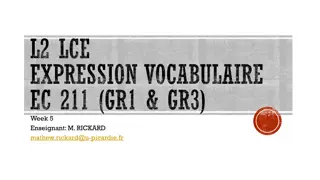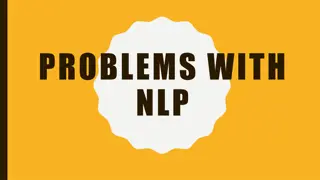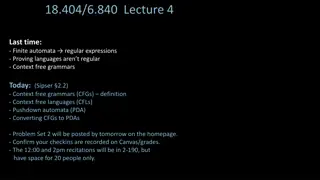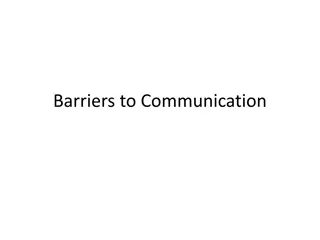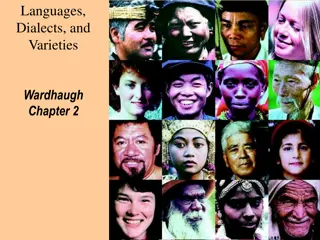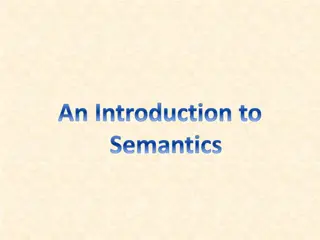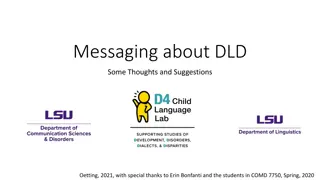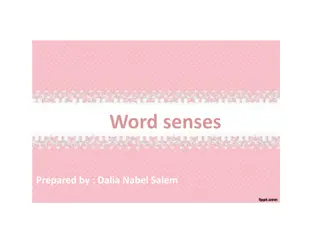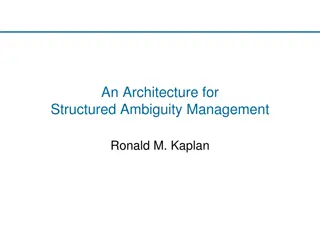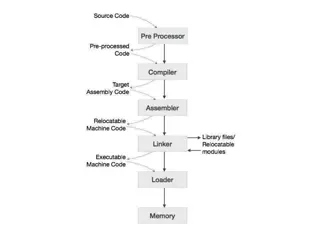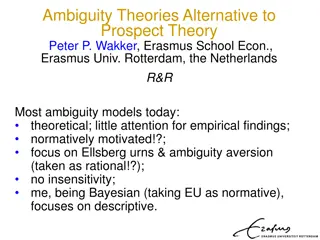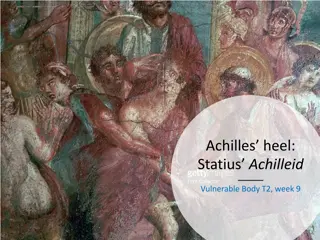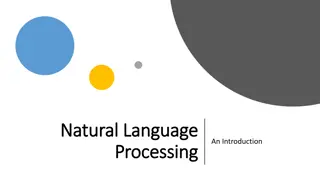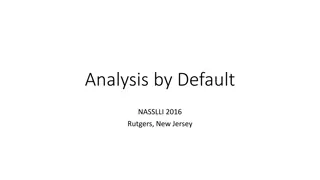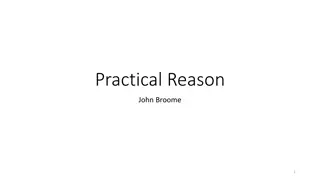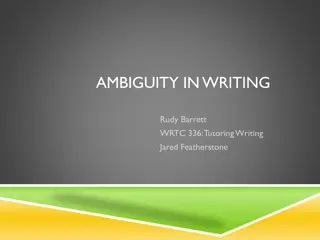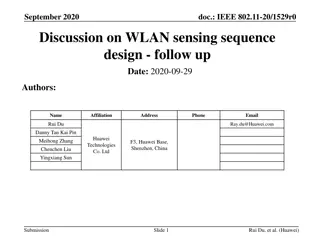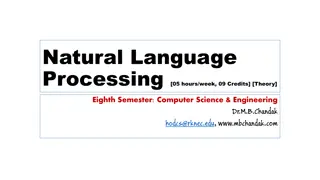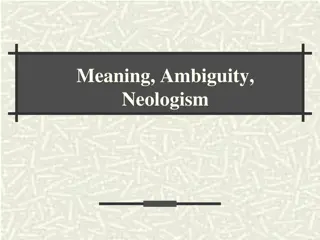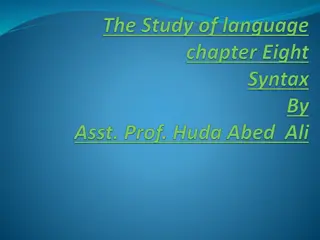Career Opportunities and Challenges in Translation & Interpreting Pedagogy Post-Pandemic
The APTIS 2022 conference explores new avenues in Translation and Interpreting (T&I) pedagogy amidst a changing landscape. Dr. Bego A. Rodriguez highlights emerging roles for T&I graduates. The context reveals a decline in language learning in the UK, impacting the Language Service Industry. The UK'
0 views • 13 slides
Language Study Community – Enhance Your Language Skills
Joining a Language Study Group is a fantastic way to take your language learning to the next level. By leveraging the power of Group Study, you can immerse yourself in the language, enhance your understanding, and build confidence in your speaking abilities. Read full article \/\/explainlearning.com
1 views • 3 slides
Academic Language Demands and Supports in Instructional Planning
Academic Language Demands and Supports are crucial in educational settings to ensure comprehension and usage of language by students. This content discusses embedding language demands in lesson plans, providing language supports, and peer review activities to enhance academic language skills. The fo
6 views • 10 slides
The Significance of Media in Language Learning
Media plays a crucial role in language learning by raising awareness of the ideology behind linguistic structures and providing valuable information on society and culture. Linguists are drawn to media language for research purposes and to understand its impact on language use and attitudes. Media s
12 views • 5 slides
Understanding Translation: Key Concepts and Definitions
Translation involves transferring written text from one language to another, while interpreting deals with oral communication. Etymologically, the term "translation" comes from Latin meaning "to carry over." It is a process of replacing an original text with another in a different language. Translat
11 views • 76 slides
Language and Communication in Society: Understanding Interactions
Explore the intricate relationship between language and society through lectures focusing on language in interaction, power dynamics, language contact and change, public space discourse, linguistic landscaping, and more. Delve into the shift from structural linguistics to societal communication, red
6 views • 28 slides
Understanding Adjective Usage in English Language
Exploring the effective use of adjectives in English language, this content covers the positioning, punctuation, and order of adjectives. It explains the difference between predicative and attributive adjectives and provides examples to clarify their usage. Additionally, it discusses the importance
1 views • 22 slides
Creolit and Cultural Identity in the Francophone Caribbean
Exploring the concept of Creolit in the Francophone Caribbean through the works of Maryse Cond, this lecture delves into the unique perspective that emphasizes the use of Creole language as a foundation for literature. It discusses the tensions between authenticity and exclusion, as well as the them
2 views • 9 slides
Understanding Ambiguity in Natural Language Processing (NLP)
Natural Language Processing (NLP) faces challenges with ambiguity, which occurs due to multiple possible interpretations of language input. Humans can often resolve ambiguity, but it's complex for computers. Types of ambiguities include lexical, syntactic, pragmatic, referential, and transient. Over
2 views • 24 slides
Understanding Ambiguity in English Language
Exploring the concept of ambiguity in the English language, this article delves into the various meanings words can convey, the challenges of ambiguity resolution, and the types of ambiguity such as lexical and structural ambiguity. Examples of homonymy and homophony are provided to illustrate how w
2 views • 27 slides
Understanding Potential Uplift Interpretation in ERCOT Protocols
ERCOT's Potential Uplift Interpretation Protocol defines Potential Uplift as the potential uplift to the Counter-Party based on short payments. The protocol outlines calculations and clarifies language ambiguity to ensure accurate interpretation. ERCOT seeks market feedback for further clarification
1 views • 6 slides
Enhancing Language Learning Across the Curriculum in B.Ed. 1st Year Course
Language Across the Curriculum (LAC) emphasizes that language learning should occur across all subjects, not just in language classrooms. It highlights the importance of incorporating language development into every learning activity, fostering multilingualism in schools. Language plays a crucial ro
2 views • 34 slides
Understanding Context-Free Grammars (CFGs) and Pushdown Automata
Exploring Context-Free Grammars (CFGs) and Pushdown Automata, covering definitions, examples, ambiguity, and conversions. Learn about generating strings, CFG formal definitions, ambiguity in grammars, and more. Connect with the basics of context-free languages and their relations to PDAs. Dive into
0 views • 13 slides
Understanding and Overcoming Communication Barriers
Communication barriers, such as physical, linguistic, cultural, mechanical, organizational, and psychological factors, can hinder effective message transmission and understanding. Physical barriers like noise and environmental stress, linguistic barriers including language ambiguity and jargon, cult
0 views • 11 slides
Understanding Language, Dialects, and Varieties: Exploring Linguistic Diversity
Explore the nuances between language, dialects, and varieties as discussed in Wardhaugh's Chapter 2. Unravel the complexities of how language relates to ethnicity and social identity, and dive into the distinctions between vernaculars and standardized forms of language. Delve into the ambiguity of t
0 views • 19 slides
Understanding Semantics: The Study of Meaning in Language
Semantics is the branch of linguistics focusing on meaning, exploring how words, sentences, and symbols convey and represent ideas. It is crucial for language acquisition, change, social contexts, and linguistic analysis. Important aspects include symbol and referent relationships, denotation, conno
0 views • 19 slides
Speech and Language Developmental Milestones: A Bilingual/Multilingual Perspective
Speech and language developmental milestones are crucial for children, regardless of their home language. These milestones encompass receptive language, expressive language, pragmatics, and articulation and phonology. Understanding how a child hears and talks from birth to one year is essential, as
1 views • 23 slides
Linguistic Microaggressions in Messaging about DLD: Thoughts and Suggestions
Linguistic microaggressions in the discourse surrounding Developmental Language Disorder (DLD) can perpetuate negative stereotypes and harm individuals. This content discusses the concept of linguistic microaggressions, explores the ambiguity in messaging about DLD, and highlights the importance of
3 views • 12 slides
Understanding Polysemy and Homonymy in Lexical Ambiguity
In lexical ambiguity, polysemy refers to one word having multiple related senses, while homonymy involves different words that sound the same but have unrelated meanings. Distinguishing between polysemy and homonymy can be challenging, but certain guidelines can help differentiate them based on shar
0 views • 27 slides
Managing Ambiguity in Language: An Innovative Approach
Language presents challenges due to its inherent ambiguity, making it difficult to map between form and meaning. This content discusses an architecture for structured ambiguity management, emphasizing the complexities of linguistic interpretation, modular mapping from text to meaning, and the pervas
0 views • 31 slides
Understanding Issues in Context-Free Grammar: Ambiguity, Precedence, Associativity, and More
Delve into the complexities of context-free grammar, exploring concepts such as ambiguity, precedence, associativity, left recursion, and left factoring. Learn about the challenges posed by left recursion and the differences between ambiguous and unambiguous, as well as deterministic and non-determi
0 views • 7 slides
Ambiguity Theories as Alternatives to Prospect Theory
This article explores ambiguity theories as alternatives to Prospect Theory, focusing on decision-making under uncertainty. It discusses the Anscombe-Aumann framework, multiple priors models, and applications of ambiguity models. The popular Anscombe-Aumann framework is detailed, with a two-stage ap
0 views • 29 slides
Introduction to Language Technologies at Jožef Stefan International Postgraduate School
This module on Knowledge Technologies at Jožef Stefan International Postgraduate School explores various aspects of Language Technologies, including Computational Linguistics, Natural Language Processing, and Human Language Technologies. The course covers computer processing of natural language, ap
0 views • 27 slides
Exploring Sociolinguistics: Language Variation and Social Factors
Sociolinguistics delves into the study of language variation influenced by social factors, examining the relationship between language and its social context. It explores various aspects like standard pronunciation, language choice, speech acts, language components, language variety, and factors suc
0 views • 73 slides
The Complex Themes of Vulnerability and Ambiguity in Statius's Achilleid
Exploring the intricate narrative of Statius's Achilleid, this analysis delves into the vulnerability of Achilles and Thetis's attempts to mitigate it, challenging the traditional epic genre through hybridity and ambiguity. The thematic interplay of divine-human dynamics, gender ambiguity, and the c
0 views • 14 slides
Introduction to Natural Language Processing
Natural Language Processing (NLP) is a field that focuses on enabling computers to understand, interpret, and generate human language. It involves tasks such as machine translation, information extraction, text summarization, dialogue systems, tagging, and speech recognition. NLP presents challenges
0 views • 26 slides
Understanding Assembly Language Programming for Computing Layers
Assembly language is a low-level programming language that enables direct interaction with a computer's hardware components. This content explores the fundamentals of assembly language, the relationship between human-readable machine language and binary code, an assembly language program for multipl
0 views • 31 slides
Understanding Analysis and Its Importance
Explore the concept of analysis, its applications, and significance. Learn about different types of analysis, such as default logic and common law constraint. Delve into examples like the similarity of figures and the definition of a chair. Understand the reasons for analysis and how it helps in res
0 views • 80 slides
Understanding Language Anxiety in Foreign Language Learning and Teaching
Explore the impact of language anxiety on students and teachers in foreign language learning and teaching contexts through insights from Dr. Christina Gkonou's research. Delve into the theoretical background, implications for language education, and real-life experiences shared at the Essex Language
0 views • 25 slides
Exploring the Ambiguity of Reason in Philosophy Through Historical Perspectives
The ambiguity and complexity surrounding the concept of reason are delved into through the historical lenses of John Broome and David Hume. From the early uses of "reason" in English to its normative implications in moral philosophy, this exploration sheds light on the multifaceted nature of reason
0 views • 21 slides
Importance of Clarity in Writing and Grammar Rules
Understanding the significance of clear writing and grammar rules is vital for effective communication. Unclear sentences with misplaced modifiers can lead to ambiguity, affecting the message conveyed. By following formal grammar rules, one can ensure clarity in academic and professional communicati
0 views • 9 slides
Analysis of "Give" by Simon Armitage: Homelessness and Language Features
Simon Armitage's poem "Give" delves into the plight of a homeless individual, portraying a mix of sadness, desperation, and bitterness through the speaker's narrative. The poet uses language features like ambiguity to highlight the complexity of the persona's situation beyond mere poverty. Through r
0 views • 10 slides
Understanding Ambiguity in Writing: Types and Examples
Explore the different types of ambiguity in writing, including lexical, syntactic, and structural ambiguity. Learn how awkward wording, dangling modifiers, and crash blossoms can lead to confusion in writing. Discover ways to identify and address ambiguity in your own writing to improve clarity and
0 views • 15 slides
Analysis of WLAN Sensing Sequence Design Using Ambiguity Function and Range-Doppler Map
In this document, the authors from Huawei discuss the analysis of employing the ambiguity function for WLAN sensing sequence design. They delve into the ambiguity function's definition, analysis, and its comparison with the range-Doppler map. The document highlights the importance of ambiguity funct
0 views • 15 slides
Comprehensive Guide to Auto Injury Litigation: NBI Section II Analysis
This detailed guide delves into the intricate coverage analysis of auto injury litigation, highlighting important legal principles and court precedents. It covers topics such as third-party rights under insurance contracts, ambiguity in insurance policy language, and the application of the reasonabl
0 views • 72 slides
Comprehensive Course on Natural Language Processing
This eighth-semester course in Computer Science & Engineering covers the fundamentals of Natural Language Processing (NLP) including basics, modeling techniques, syntactic and semantic parsing, information extraction, and machine translation. Prerequisites include knowledge of English grammar, theor
1 views • 16 slides
Hope Amid Crisis: Normative Ambiguity, the Middle Class, and Investment Fraud in 2000s Venezuela
The study delves into the impact of Stanford Financial Group's investment scheme in Venezuela between 1986-2009, particularly on the middle-class Venezuelans. It explores how normative ambiguity affected the financial decisions of middle-class individuals, highlighting the interplay between futurity
0 views • 10 slides
Understanding Ambiguity in Translation Theory
Exploring the complexities of ambiguity in translation theory, this content delves into the nuances of meaning, neologisms, and the challenges faced by translators in deciphering text. It discusses the various types of ambiguity, such as lexical and semantic, highlighting their impact on language in
0 views • 27 slides
Understanding Homonymy in Lexical Semantics: Examples from English and Arabic
Explore the concept of homonymy in lexical semantics through examples in both English and Arabic languages. Homonymy refers to words that share the same form but have unrelated meanings, leading to ambiguity in communication. Examples of homonyms in English and Arabic showcase how words can have mul
0 views • 27 slides
Understanding Grammar and Syntax in Linguistics
Grammar and syntax are two fundamental components of language study. Grammar entails rules for correct language usage, while syntax focuses on sentence structures. Deep and surface structures, along with examples and distinctions between active and passive voice sentences, are explored. Structural a
0 views • 21 slides






